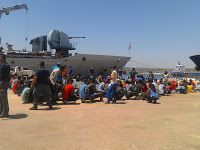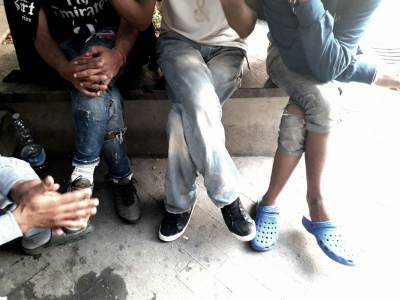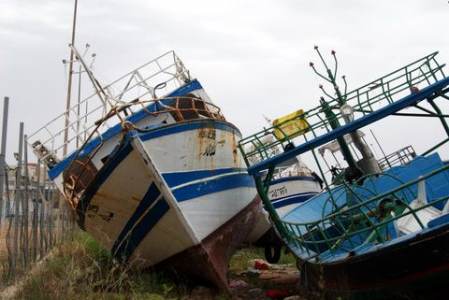We Are Rebuilding the Emergency
The
piercing cry of children, the black stare of a young man accused of smuggling,
the fear of a woman who cannot withstand the umpteenth queue, the uncertain
advance of the hundreds who descend the steps of the Dattilo awaiting the next
interminable line into the unknown. We have assisted at this disembarking as at
many others in Palermo in recent days, where 1,052 people were landed after
having been saved in eight different Search And Rescue operations.
As usual,
everyone present at the port, institutional and otherwise, made their effort
for a good outcome to the operation. But as usual good will is not enough, and
it is inevitable that the problems in a malfunctioning system are shown up in
the process. The young men in line clearly are having difficulty. It is enough
to observe how they hold themselves whe the police ask them to wait yet again:
they sit on the ground, and their position is just as inside a boat, one behind
the other, a sign of fear and psychological distress. They bear the torture and
violence with them, remaining indelibly within their memories.
After three
days on the boat, the excoriations of the skin are evident, and passing an
entire day under the burning Palermo sun is no holiday. For many, the journey
continues immediately after landing, taken by coach to Lombardy, Venice,
Tuscany, Campania and Piedmont. Others, including minors, before arriving at
the emergency centres, passed the night out in the open, in the police station,
waiting late into the night for the taking of fingerprints. And for another 85
adults, who declared themselves minors, fate has played another game: a night
spent at the port inside a coach, to be taken from the Palermo police station
at dawn, and finally to be set off on their journey, around 9am the next day:
CAS* in the central Italian province of Marche.
Foto Alberto Biondo
And it is
the newly arriving minors, those coming from Gambia, Nigeria, Guinea, Ivory
Coast and Senegal, who remain in Sicily, who will pay the high price for a
collapsing system. As there are no free posts in centres for minors, they will
be forced to pass an indefinite and illegal period of time in a Hotspot (as is
happening till today in Lampedusa and Pozzallo). Or, as in Palermo, they will
be taken into emergency centres staffed by volunteers (as those made available
by Caritas) or crammed into the existing centres, scenes of daily protest (for
example, at the Asante centre on Via Monfenera in Palermo). Or worse still,
they will be sent to centres in economic deficit, which free themselves of
newly turned 18-year-olds by placing them at the door out of the blue, wiping
out any hope or expectations (as with the case of a young Nigerian man, a
former resident of the “Dumbo” centre in Licata).
We cannot
leave out, obviously, the singling out of 16 presumed smugglers (two for each
boat rescued), scapegoats to slap on the front page, and 27 potential judicial
witnesses.
All that
remains, after a disembarking of so many people, are the plastic bags floating
along the quay and the indelible memory of the migrants’ gaze. In his failed
system, the good will of NGO workers who, as much as they can, attempt to ease
people’s arrival and permanence, is simply not enough. But surely it is enough
to cry out once more that we are in full emergency, so as to allow the cogs to
run more smoothly for those who manage and profit from this killing game.
Alberto Biondo
Borderline Sicilia Onlus
Project “OpenEurope” – Oxfam Italia, Diaconia Valdese, Borderline Sicilia Onlus
CAS* – Centro
di accoglienza straordinaria :
Extraordinary Reception Centres
Translated
by Richard Braude







